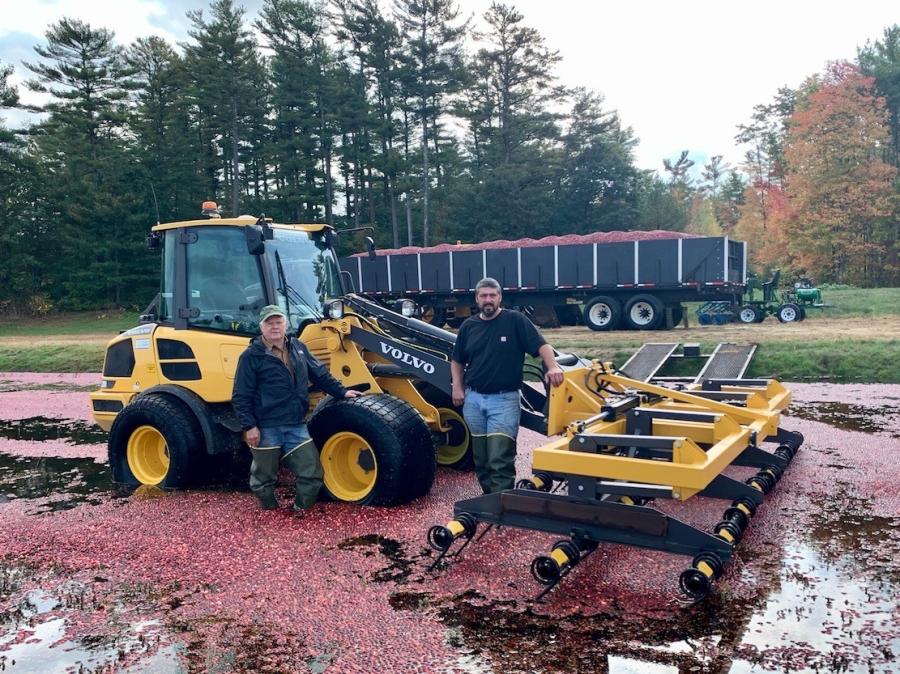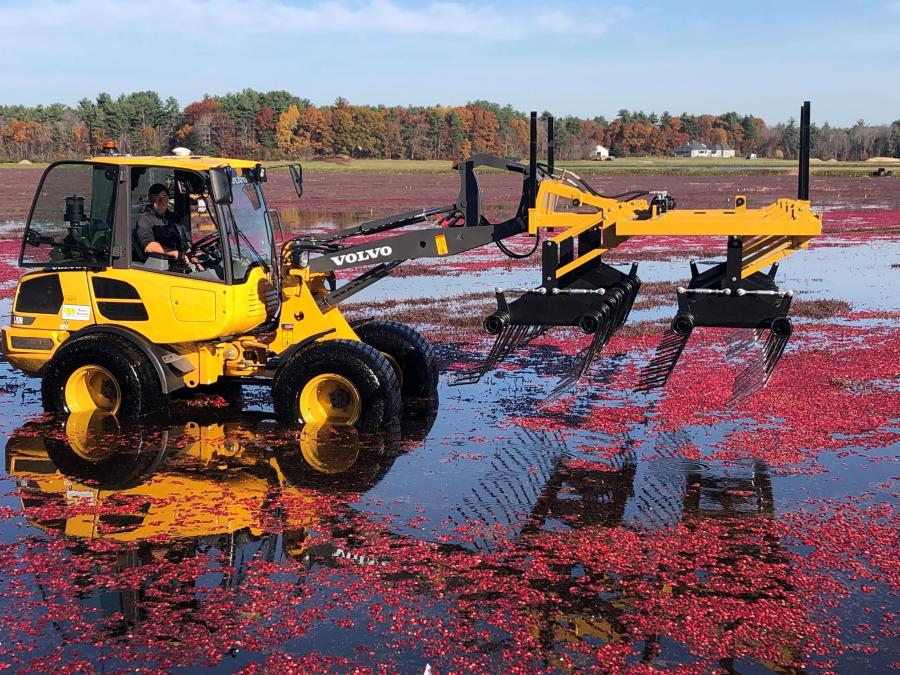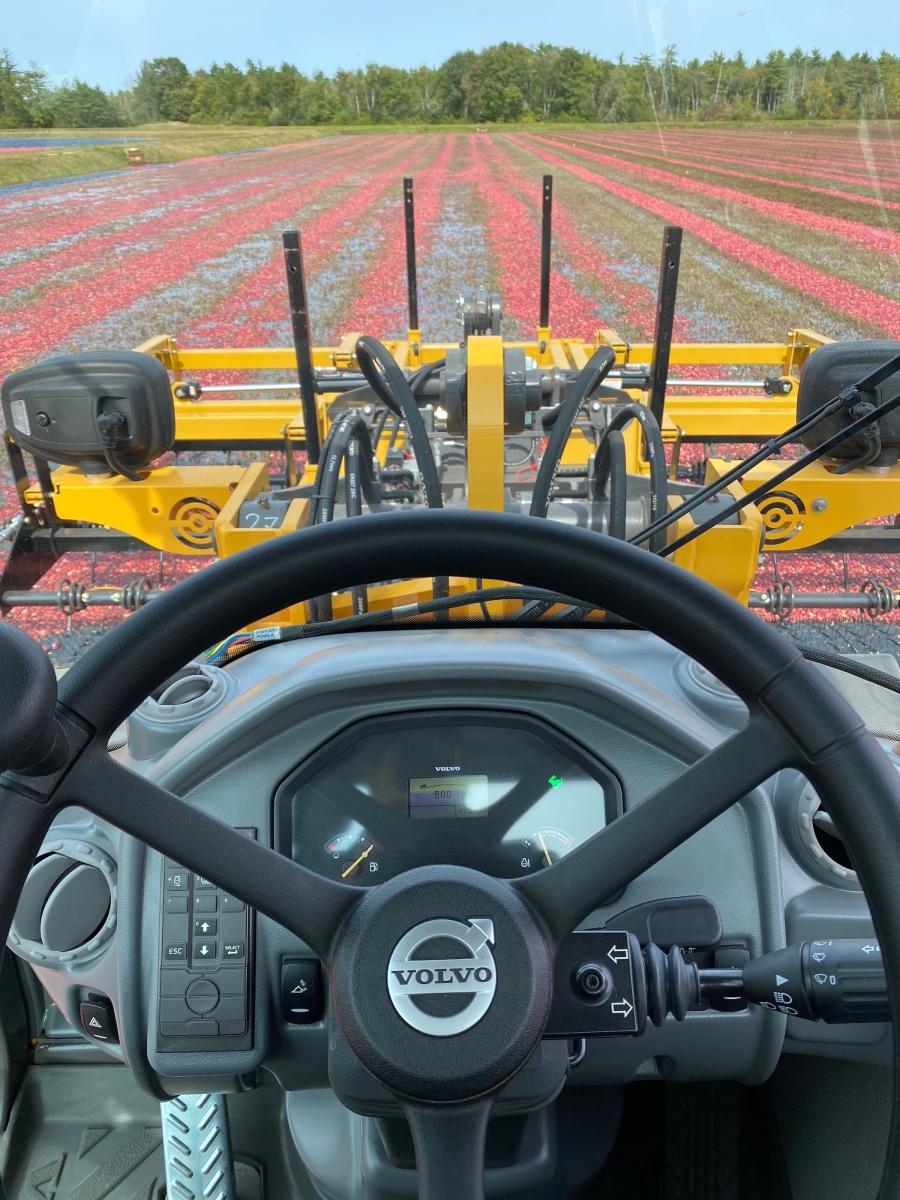Mon November 23, 2020
Volvo
During late September through October, as the temperature begins to lower and the leaves change into brilliant New England fall colors, the culmination of a year's work begins with the annual Cape Cod cranberry harvest. Each year, the region harvests more than 14,000 acres of the ruby red berries, known as America's first fruit.
Today's cranberry growers are third and fourth generations to farm the bogs.

Gary Weston (L), owner of Weston Cranberry Corporation, and Chris Cokinos. (Bob Rosa, Woodcocks Machinery photo)
For an equal number of generations, the water reel has been the chosen method to pick berries. This equipment advanced from walk-behind inventions to ride-on and motorized versions, each designed and produced by the individual farm. The reels churn the flooded bogs, gently coaxing ripe berries to the surface so they can be corralled and suctioned out of the water.
This year, a crop of Volvo L20H compact wheel loaders began appearing across the bogs.
"At 9,900 pounds and 60 horsepower, modified with wide flotation tires, this machine is ideal for powering a locally designed and produced harrow," said Bob Rosa with Volvo Construction Equipment dealer Woodco Machinery in Woburn, Mass.
Rosa introduced the loaders grower by grower. They are a tight-knit set who have weathered a testy market for their berries and competition from Wisconsin, which now leads the nation in cranberry production. They take pride in their land, their occupation and heritage and lean on each other for support. They share what some describe as a "brotherhood of the bogs." Most are members of the Cape Cod Cranberry Growers' Association.
As a native of the Bay State, Rosa wanted to help the growers thrive and knew that the compact loaders could assist them far beyond the short harvest window.
Gary Weston, owner of Weston Cranberry Corporation in Carver, was the first to switch to Volvo compact loaders. He instantly realized how much faster he could harvest berries. For Weston, the decision to go with Volvo was based on the proven experience he had with his fleet of Volvo excavators and trucks, and trusting Rosa's advice.
Weston said, "I like the quality of the Volvos, their ease of use and the comfortable cab with heat, a/c and radio. With a travel speed of 18.5 mph, once we finish with one bog, the Volvo can be driven to the next bog rather than being trailered as with our previous machines."

Derek Harju uses a special 4-tine harrow on his Volvo L20H compact loader. (Bob Rosa, Woodco Machinery photo)
Another convert is Derek Harju of Ken Harju & Sons Cranberries Inc. in Middleboro, Mass.
"With the Volvo loader, the time to pick a 26-acre bog has gone from ten hours with three water reels to five hours with one machine," he said.
Harju uses a special 4-tine harrow on his loader.
The Volvo loader skims across the bogs at a speed of three miles per hour versus 1.5 miles per hour with the homemade reel machines. The custom 17-ft. wide harrow takes fewer passes, resulting in less disturbance on the vines. Harju also opts for biodegradable hydraulic oil for a safer environment.
Because it can be easily fitted with a range of attachments, rather than store for another season the Volvo is on duty year-round. On Harju's farm, it will function as a forklift, be fitted with sickle-bar mower, load small bog sanders and plow snow.
As Volvo shifts to electric compact equipment, today's diesel loaders may one day be superseded with all-electric models, which offer the same power and performance. It's a plausible next step for this group of growers who straddle staying rooted in tradition while eyeing a sustainable future for their families and farms.
In addition to Weston and Harju, Cape Cod cranberry growers throughout the region use Volvo excavators, loaders and haul trucks, including:
- Johnson Cranberries Ltd Partnership
- Oiva Hannula & Sons Inc.
- United Cape Cod Cranberry Co Inc.
- Morey Custom Services
- Federal Furnace Cranberry Co.
For more information, visit www.volvoce.com.

"At 9,900 pounds and 60 horsepower, modified with wide flotation tires, this machine is ideal for powering a locally designed and produced harrow," said Bob Rosa of Volvo Construction Equipment dealer Woodco Machinery in Woburn, Mass. (Bob Rosa, Woodco Machinery photo)
This story also appears on Construction Equipment Guide.
 Aggregate Equipment
Aggregate Equipment Articles
Articles Sign up for Updates
Sign up for Updates Sell Your Machines
Sell Your Machines

 Aggregate Equipment
Aggregate Equipment Aggregate Dealers
Aggregate Dealers Aggregate Articles
Aggregate Articles Sign up for Updates
Sign up for Updates Sell Your Machines
Sell Your Machines